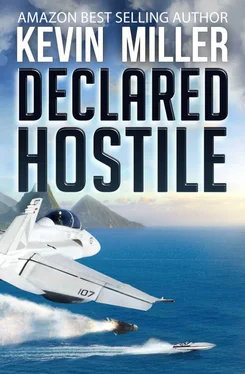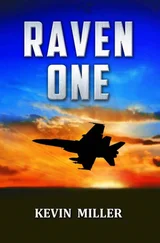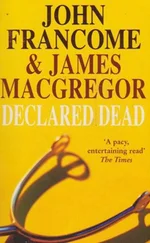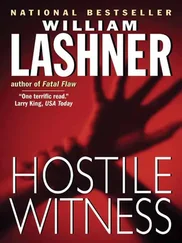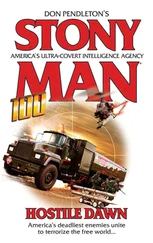Across the channel was Trinidad. Freedom . The Bolivarian Republic should have taken that, too: The English-speaking mongrels were no match for the AMV. Hernandez and his pilots could run up and down the island with impunity — like the damn Americans were now doing over his homeland.
Nearby, nervous perimeter soldiers scanned the sky for more Yankee angels of death. A call came in, and Hernandez got back in the helicopter. They flew only three minutes northwest before the pilot again lifted the nose high to land in a small clearing. The ground was stable as they strode to the tree line. Once there, a soldier pointed to a mangled piece of metal, one Hernandez recognized as an ejection seat.
It was empty.
(Flag plot, USS Coral Sea )
As Davies stepped away from his chair in flag plot, he caught himself watching the recovery on the PLAT, a mindless time waster from his younger days. He needed to decompress, to stretch, but he could not allow himself to be seen doing so by the watch standers. Río Salta mined. San Ramón out of action. The Bolivarian Navy staying in port. Aruba defended, and the Marines facing down Castro’s brigades along the fence line at GITMO. The Russians staying away. The Air Force was doing good work in and around Caracas, and TR was passing the Bahamas, en route with more carrier airpower.
All was going well for SOUTHCOM, except for the one downed pilot in Venezuela, Davies’s pilot, and he wanted Wilson back more than any of them. He looked at the monitor of CNN and saw Wilson’s wife being interviewed and pictures of Wilson in his service dress uniform. His missing pilot was all over the media, the “war” Davies was fighting now a sideshow. While it was good that the public cared, the calls from Miami were coming every 30 minutes. Have you found him yet? Have you found him yet?
What was he supposed to do? Just send a helicopter full of SEALs some 400 miles to the Venezuelan coast and hope ? He needed something more than “He ejected here—” from his wing commander before he risked more of his men in that dense, swampy brush. Was Wilson alive? Already captured? Davies needed SOUTHCOM’s national asset help now. Tell me where he is SOUTHCOM, and I’ll go get him. Hell, just give me a 25-square-mile area to start from!
Davies walked into the vestibule and stretched his arms and back out of sight of the others. He then returned to his seat and took a sip of cold coffee from his porcelain mug.
Tim Matson walked up to him with a tall woman, one of his pilots, in tow. He could see Matson’s fatigue, but everyone was exhausted. Stress and overwork was a staple of shipboard life, especially in the throes of combat.
“Admiral, may we have a word with you in the ops spaces?”
“Yes.” Davies got up and led them to the conference room next door. Matson introduced him to LCDR Kristin Teel of the Firebirds . All business, Davies gave her a perfunctory handshake and said, “Okay, whatcha got?”
Spreading a chart on the conference table, Olive began. “Sir, XO Schofield asked me to spend some time investigating Skipper Wilson’s ejection. We have eyewitness evidence that he may have ejected here at 19:32:34 local, and we received a transponder hit that corresponds to an ejection at this exact spot. That and the eyewitness account are pretty solid pieces of evidence that he ejected over Venezuela.”
“Concur,” Davies growled, wanting Olive to get to the point. She sensed that she needed to be faster and funnier.
“Yes, sir. We then took satellite imagery of the weather over the target area at that time and overlaid it on this chart, and then the radar imagery.” As Olive overlaid the translucent imagery slides over the chart, a thunderstorm with heavy return was next to the lat/long of the first transponder hit. “And, when we include the winds at altitude, the winds were out of the south, southwest.”
“Keep going,” Davies said, more interested.
“Now we overlay imagery at five-minute intervals,” Olive said as she placed slides over the chart and waited, then again and waited. Like a slow cartoon, the thunder cell transited across the Columbus Channel and crossed over Trinidad. The imagery showed it took approximately 20 minutes to do so. Davies was quick enough to see where Olive was going.
“You think Wilson’s in Trinidad?”
Olive stood up straight as she answered. “Yes, sir. There are accounts of aviators who have ejected inside storms and ‘ridden’ them for miles — and survived.”
“You just said he ejected outside the storm.”
Olive was ready for this one, and laid a schematic of a typical thunderstorm on the table. “Yes, sir, but storms pull in air from the bottom. We think Skipper Wilson got out in the vicinity of 10K. He could have been sucked into the storm, and the winds at altitude would have helped by giving him a push.”
“Why hasn’t he called us?”
“Sir, he may have lost his radio during ejection. The strikers heard him on his survival radio moments before, and he was observed rolling his jet out to sea before it went into a steep dive. He was probably trying to recover the aircraft and may not have had time to stow his radio in his gear.”
“He could be captured.”
“Yes, sir, but he could be in Trinidad.”
“Okay. Then why doesn’t he contact the locals?”
“Sir, he could be anything from injured to captured to dead. But we have no imagery, no visual signals that prove he is on the ground in Venezuela. Nor do we have any intel that the Venezuelans have him. We do know the jet impacted in Venezuela and that the Venezuelans are at the crash scene.”
Davies studied the chart. The storm track imagery she laid out crossed over the southeast tip of Trinidad. It could have deposited him on the island. It could have carried him and dumped him out to sea. However, with SOUTHCOM breathing down his neck, and being inclined to action, as were his aviators, he made a decision. Why not?
“Okay. Tim, get with my Ops, and get your guys on Tobago spun up. Have them fly this track to see what they can see.”
“Yes, sir. Shall we get dip clearance?”
“No, fuck ‘em. We can apologize later, but we can’t shut them up when our birds lift off from their frickin’ air patch. They’ll know something is up, and the Venezuelans will know it, too.”
Matson nodded. “Yes, sir, and I’m going to launch two Hornets to hold offshore to be called in if needed.”
Davies nodded his approval. “Yeah, make it happen.” Turning to Olive, the admiral said, “Commander, what do you go by?”
“Olive, sir.”
“Olive. Nice job, Olive.” Davies said and spun for flag plot to inform SOUTHCOM of his new plan — for now, his best and only plan.
Wilson got to the stream before sundown and lay in the mud as he drank his fill of fresh water. After he topped off his water bottle, he tended to a wound on his left wrist. During his fall through the trees, a branch had scraped it and drawn blood. The intense throbbing in his hand caused him to fear infection.
Wilson considered his situation. He faced another night in a damp flight suit, shivering as he tried to conserve energy. He had water now, but needed food to keep up his energy, and he needed to keep warm. But what food? As the light receded, he looked around for berries and found some red ones. He took a taste and spit out the bitter fruit. He wasn’t that hungry, and didn’t need a stomach infection to add to his woes.
Wilson crawled to a spot near a fern and was able to fashion a crude bed from the large green leaves of nearby vegetation. Puffy buildups hovered above, as they always did in a clear sky. He could detect no rain, either by sight or smell, and he could hear no rumbles of thunder. He would sleep here and keep going. Wilson removed his left boot but found he could not remove the other boot from his swollen foot. He feared trench foot — or worse — was developing.
Читать дальше
